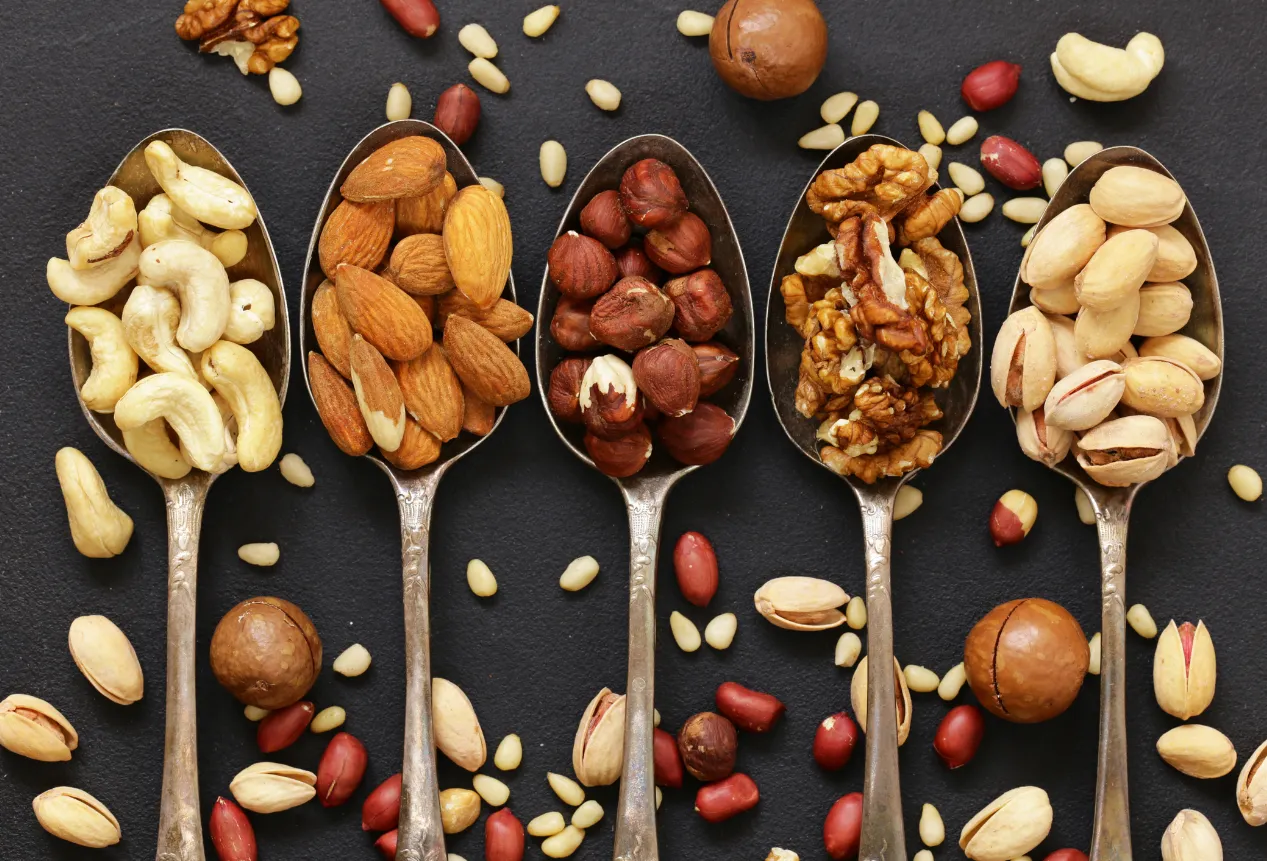
Written by Elizabeth V., product owner in Eat Beat app
Editing by Olivia G., editor in Eat Beat app
What You’ll Learn
Despite being high in fat, a daily handful of nuts—though not all varieties—does not lead to weight gain. Evidence from long‑term cohort studies and meta‑analyses shows that people who regularly eat nuts gain less weight over time than those who avoid them.
Table of contents
Why Raw Nuts Don’t Make You Gain Weight: 8 Reasons
Nuts Make You Feel Full (Satiety)
Nuts are packed with protein, fiber and unsaturated fats—nutrients known to increase satiety. Studies show that high‑protein, high‑fiber foods suppress hunger more effectively than refined carbohydrates. In trials where participants ate almonds or walnuts as snacks, they reported feeling fuller and ate less later in the day than when eating an equal‑calorie snack such as crackers. The need to chew nuts thoroughly further slows eating, which enhances satiety signals and reduces overall intake.
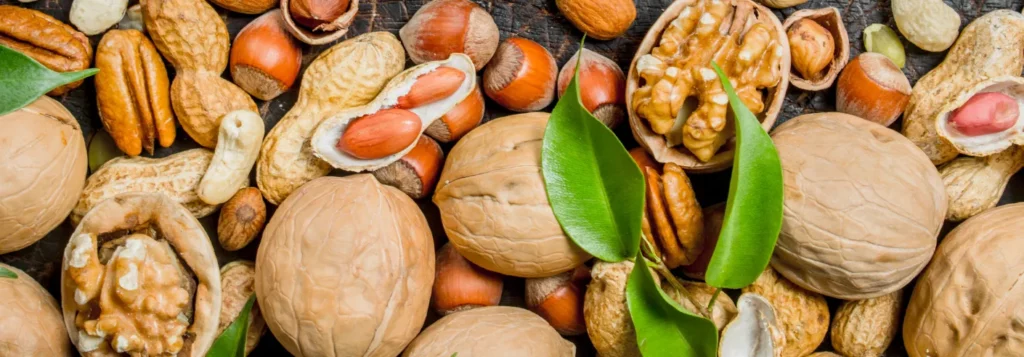
You Eat Less Later (Calorie Compensation)
Adding nuts to a diet does not necessarily add calories because people subconsciously eat less of other foods. A controlled trial found that when participants ate daily nut snacks, they displaced 61 % of the added calories by reducing their intake of other foods. A review of feeding studies concluded that between 55 % and 75 % of the energy from nuts is spontaneously compensated for through reduced subsequent intake.
Not All Calories of Nuts Are Absorbed
Whole nuts have rigid cell walls that resist digestion; as a result, a portion of their fats and carbohydrates passes through the gut unabsorbed. Metabolic studies measuring the energy in participants’ feces show that 10–15 % of the energy in nuts is excreted rather than metabolised. A separate feeding trial found that a 28‑gram serving of cashews delivers about 137 kcal—16 % less energy than the 163 kcal predicted by standard Atwater factors.
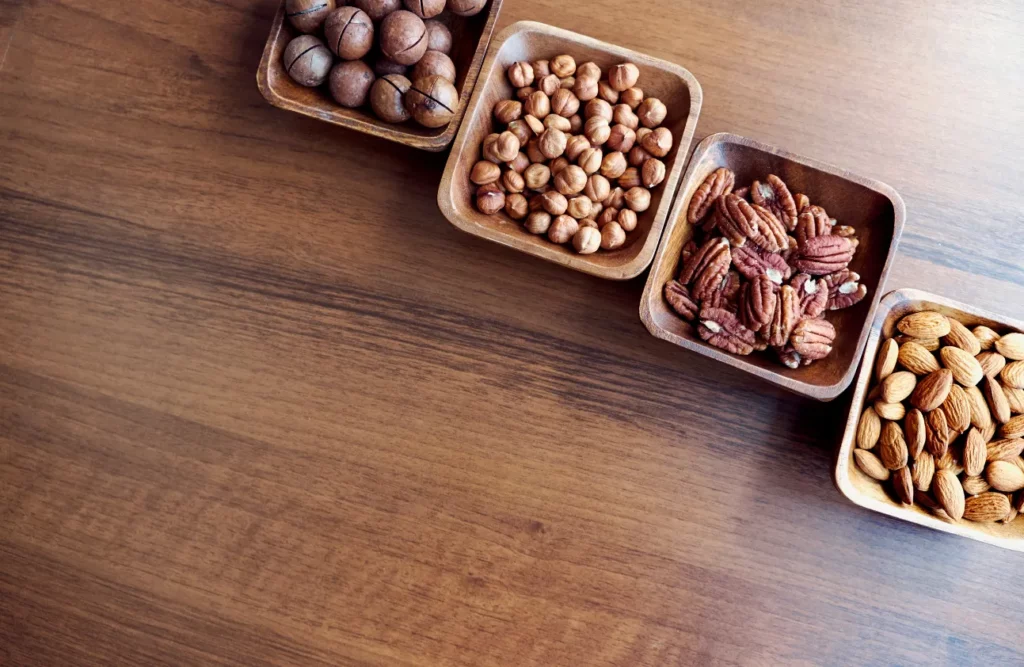
They Boost Thermogenesis
Protein and unsaturated fats increase the thermic effect of food, meaning the body burns more energy digesting them. Reviews of nut‑feeding studies report small but measurable increases in resting energy expenditure when nuts are consumed regularly. This extra caloric burn partially offsets the calories provided by nuts.
They Slow Gastric Emptying
The soluble fibers in nuts absorb water and form a gel in the stomach, delaying gastric emptying and slowing the release of nutrients into the bloodstream. This prolongs feelings of fullness and helps prevent rapid spikes in blood sugar. Improved satiety and stabilized blood glucose can reduce cravings and overeating later in the day.
Nuts Replace Less Healthy Foods
People often eat nuts instead of more processed snacks like candy, pastries or processed meats. Large prospective cohorts show that higher nut intake is associated with less long‑term weight gain and lower risk of obesity. Substituting nuts for red meat or refined carbohydrates improves diet quality and may reduce waist circumference and cardiovascular risk.
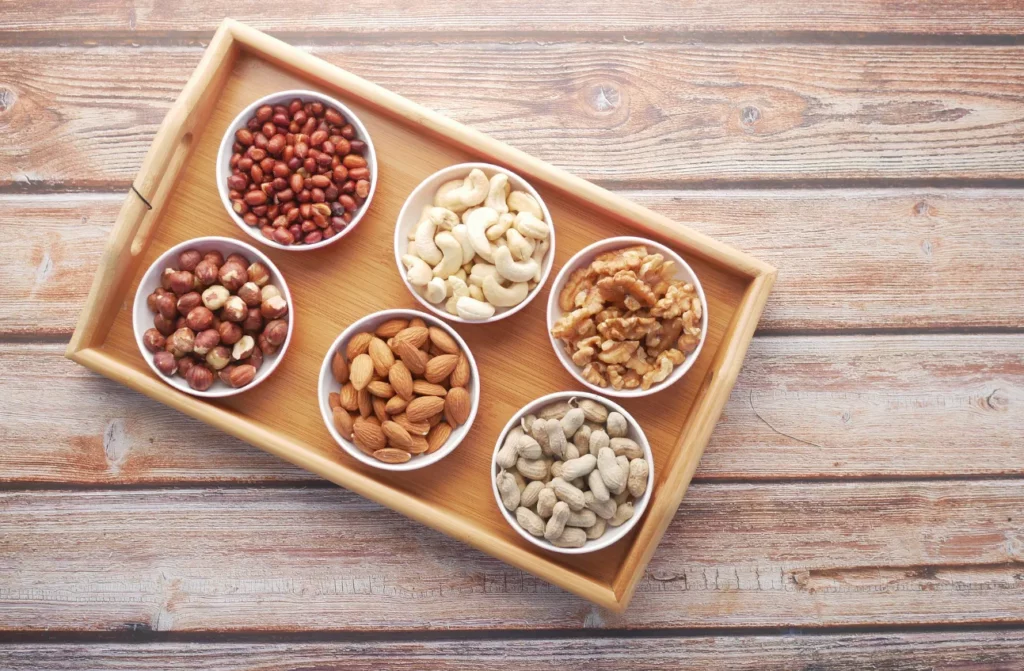
Texture of Nuts Slows You Down
Nuts’ crunchy texture requires more chewing than soft, ultra‑processed foods. Eating slowly gives the gut–brain axis time to register fullness and can lead to a lower overall calorie intake. Observational research links diets rich in chewy, minimally processed foods with smaller waist circumferences.
Calories on Labels Overestimate Reality
Most food labels use Atwater factors to calculate calorie counts based on protein, fat and carbohydrate content. These factors assume nearly complete digestion and absorption, which isn’t accurate for nuts. Human feeding studies show that the metabolizable energy of whole nuts is 16–25 % lower than predicted. For example, the cashew study noted earlier found that measured energy was 137 kcal versus the labeled 163 kcal.
Nutrients, Vitamins & Minerals in Raw Nuts per 100g
Macronutrients In Row Nuts (Per 100g)
| Nut | Calories (kcal) | Protein (g) | Fat (g) | Fiber (g) | Carbs (g) |
|---|---|---|---|---|---|
| Hazelnut | 628 | 15.0 | 60.8 | 9.7 | 16.7 |
| Almond | 579 | 21.2 | 49.9 | 12.5 | 21.6 |
| Cashew | 553 | 18.2 | 43.9 | 3.3 | 30.2 |
| Peanut | 567 | 25.8 | 49.2 | 8.5 | 16.1 |
| Pistachio | 560 | 20.2 | 45.3 | 10.3 | 27.2 |
| Pecan | 691 | 9.2 | 72.0 | 9.6 | 13.9 |
| Brazil nut | 659 | 14.3 | 67.1 | 7.5 | 11.7 |
Vitamins & Minerals In Raw Nuts (Per 100g)
| Nut | Vitamin E (mg) | Magnesium (mg) | Potassium (mg) | Zinc (mg) | Selenium (mg) |
|---|---|---|---|---|---|
| Hazelnut | 15.0 | 163 | 680 | 2.5 | 2.4 |
| Almond | 25.6 | 270 | 705 | 3.1 | 2.6 |
| Cashew | 0.9 | 292 | 660 | 5.8 | 19.9 |
| Peanut | 8.3 | 168 | 705 | 3.3 | 7.5 |
| Pistachio | 2.9 | 121 | 1025 | 2.2 | 7.2 |
| Pecan | 1.4 | 121 | 410 | 4.5 | 3.8 |
| Brazil nut | 5.7 | 376 | 659 | 4.1 | 1917.0 |
Raw Nuts: Healthy Snack Ideas That Actually Keep You Full
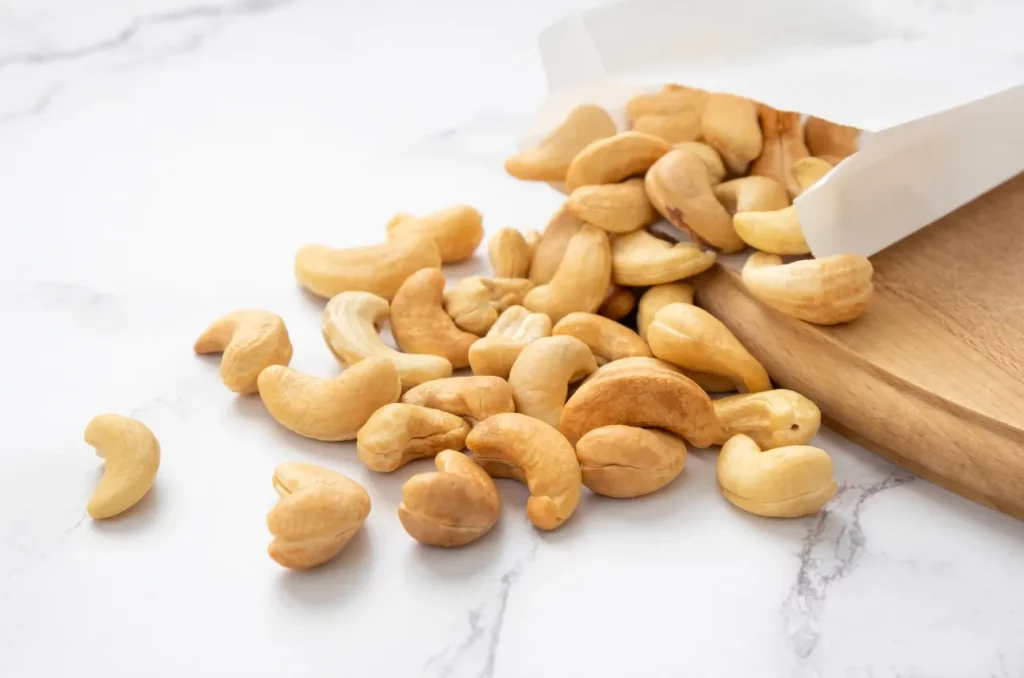
Keep nuts about 20–30 grams per day, since this provides heart‑healthy fats and micronutrients without excess calories. The reason nuts are “weight‑neutral” is multifaceted: they increase satiety, reduce subsequent food intake, and some calories aren’t absorbed or are burned off through increased thermogenesis.
Try a New Revolutionary Way to Lose Weight with Eat Beat

Which Nuts Are the Most Nutritious?
Each type of nut has its own unique nutritional profile, but a few stand out:
- Almonds are the highest in vitamin E and fiber, making them excellent for heart health and digestion.
- Brazil nuts are by far the richest source of selenium—just one or two nuts a day provides more than 100% of your daily needs.
- Pistachios offer the most potassium and a solid amount of protein with relatively fewer calories.
- Cashews are particularly high in magnesium and zinc, important for muscle function and immune health.
- Peanuts (technically legumes) lead in protein content and are very satiating.
- Pecans are the most calorie-dense but also rich in antioxidants and healthy fats.
- Hazelnuts are a great source of monounsaturated fats and vitamin E.
In short, almonds, pistachios, and Brazil nuts are often considered top picks for nutrient density. However, variety is key: rotating different nuts into your diet ensures a broader spectrum of health benefits.
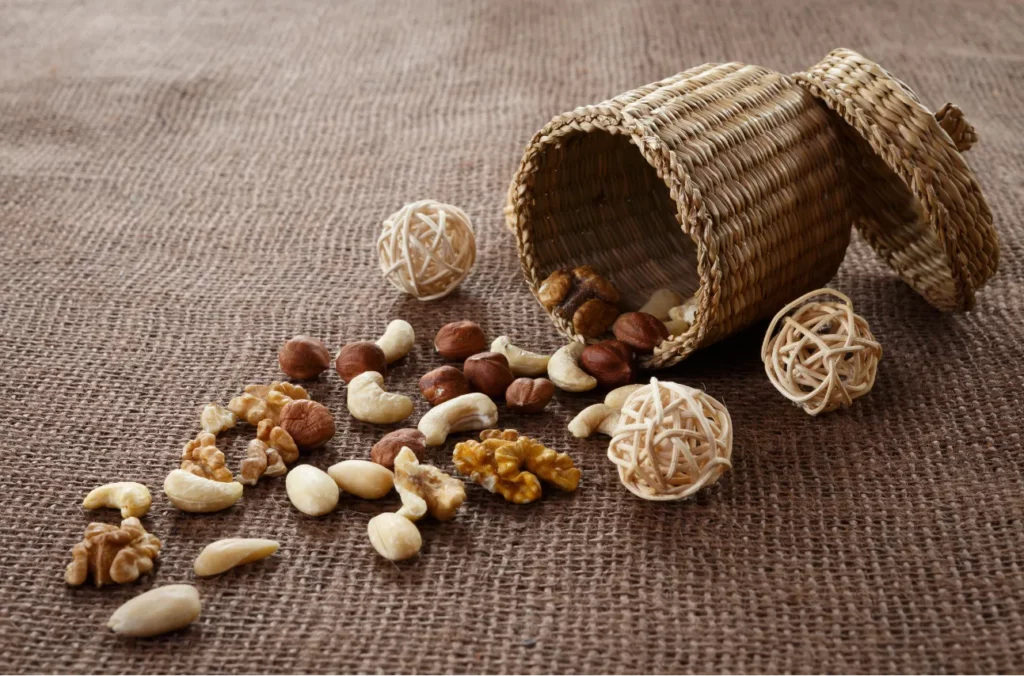
Take‑Home Messages
- Only raw nuts don’t cause weight gain.
- Moderation matters: Nuts are nutrient‑dense and can support weight management when eaten in recommended portions of about 20–30 g per day. Overeating any food—including nuts—can lead to weight gain.
- Variety and balance: Incorporate nuts into a balanced diet rich in fruits, vegetables, whole grains and lean proteins. Replace less healthy snacks with a small handful of nuts.
- Lifestyle counts: Regular physical activity and mindful eating remain essential for weight maintenance. Nuts support, but do not replace, these habits.
Scientific evidence from long‑term cohorts and randomized trials indicates that nuts do not inherently cause weight gain. Instead, their unique nutritional composition and physical properties help control appetite, reduce energy absorption and increase thermogenesis. Enjoy nuts as part of a varied diet, and let them work for your health—not against your waistline.




